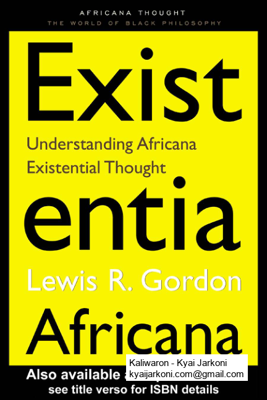1 Africana Philosophy of Existence. 1. 2 A Problem of Biography in Africana Thought. 22. 3 Frederick Douglass as an Existentialist. 41. 4 What Does It Mean to
241 pages
165 KB – 241 Pages
PAGE – 5 ============
Published in 2000 by Routledge29 West 35th Street New York,NY 10001 Published in Great Britain by Routledge 11 New Fetter Lane London EC4P 4EECopyright © 2000 by Routledge This edition published in the Taylor & Francis e-Library,2002. All rights reserved.No part of this book may be reprinted or reproduced or utilized in any form or by any electronic, mechanical,or other means,now known or hereafter in- vented,including photocopying and recording,or in any information storage or retrieval system,without permission in writing from the publisher. 10 9 8 7 6 5 4 3 2 1 Library of Congress Cataloging-in-Publication Data Gordon,Lewis R.(Lewis Ricardo),1962Ð Existentia Africana :understanding Africana existential thought / Lewis R.Gordon. p.cm.Ñ (Africana thought) Includes bibliographical references and index. ISBN 0-415-92643-2 (hardcover :alk.paper) ISBN 0-415-92644-0 (pbk.:alk.paper) 1.Afro-American philosophy.2.Existentialism. I.Title.II.Series. B944.A37 G672000 142′.78’08996ÑDC2199-047909 ISBN 0-203-90075-8 Master e-book ISBN ISBN 0-203-90079-0 (Glassbook Format)
PAGE – 8 ============
˙˙˙ ! #$(˙ W.E.B.Du Bois on the Study of Black Folk ),( Naomi Zack on Mixed Race ( An Existential Portrait in Black and White 0 Existential Anxieties of Pan-Africanism and Postmodernism at the End of the Twentieth Century / ,$ Invocations and Evocations of a Wayward Traveler 2 $ % .
PAGE – 9 ============
What indeed could be more grotesque than an educated man,a man with a diploma,having in consequence un- derstood a good many things,among others that Òit was unfortunate to be a Negro,Óproclaiming that his skin was beautiful and that the Ò big black hole Ówas a source of truth.Neither the mulattoes nor the Negroes under- stood this delirium.The mulattoes because they had es- caped from the night,the Negroes because they aspired to get away from it.Two centuries of white truth proved this man to be wrong.He must be mad,for it was un- thinkable that he could be right. ÑFrantz Fanon,ÒWest Indians and AfricansÓ Because it is a systematic negation of the other person and a furious determination to deny the other person at- tributes of humanity,colonialism forces the people it dominates to ask themselves the question constantly:ÒIn reality,who am I?Ó ÑFrantz Fanon, The Wretched of the Earth Your own Truth Commission.Lights.Cameras.Notoriety. Days upon days of probing our insides.We show our in- sides gladly.All we ask is that you not eat them. ÑMonifa Love, Freedom in the Dismal
PAGE – 10 ============
his book is dedicated to William R.Jones,professor emeri- tus ofAfrican American Studies and Religious Studies at Florida State University at Tallahassee.Prior to his work at Florida State,Jones taught philosophy ofreligion at the Yale Divin- ity School.It was during that period that the rst edition ofhis classic work in Africana religious thought, Is God a White Racist? A Pre- amble to Black Theology ,appeared.The work challenged black libera- tion thinkers to take seriously the possibility that the signs and symbols ofthe Western religions upon which they depended may harbor the seeds oftheir destruction.Instead,Jones counseled,a liberation project stands a good chance ofmeeting its goals through an appreciation ofhuman agency in the formation ofrad- ical,historical change.Old-time religion may have helped black people survive;liberation,however,requires a more radical path. Jones took his own counsel seriously.For him,there was,and continues to be,no point in intellectual work ifthere is no com- mitment to the values it represents.It is the intellectualÕs task to take on the struggle over ideas.The importance ofthat task is evi-
PAGE – 11 ============
dent whenever we realize the revolutionary impact ofideas.Ideas are part ofthe creative movement ofsocial change.Without new ideas,we would continue to e ect more ofthe same;we would continue simply to change players without changing games. Bill Jones earned his doctorate in the philosophy ofreligion with a Brown University thesis on Jean-Paul SartreÕs critical methodol- ogy.This work was written in the 1960 s during the Black Power movement and the Vietnam War.At the heart ofJonesÕs analysis was the conviction that oppression must be overcome,but no such overcoming can emerge without a critical understanding of humanreality.Jones emerged,in other words,as an existential revolution- ary.He took very seriously the existential insight that struggle in- volves negotiating the relationship between institutions and situated human beings.In 1974 ,this commitment took the form of ÒCrisis in Philosophy:The Black Presence,Óhis urgent call for the development ofa black professional philosophical community, which was published by The Proceedings and Addresses of the American Philo- sophical Association .His e orts motivated the young Lucius Outlaw, Leonard Harris,and several scholars ofphilosophy in the Mid-At- lantic region to organize discussion groups,thus leading eventuallyto the founding ofthe American Philosophical Association Committee on the Status ofBlacks in Philosophy.That committee has since had a great in uence on the path from black philosophy to Afro-Ameri- can philosophy to African American philosophy.In addition, through dialogue with international scholars with similar concerns, African philosophy made its way into the American and European curricula,and dialogue with the Caribbean led to contemporary discussions ofand in Africana philosophy. In the meantime,Jones continued his institutional work.He or- ganized special fellowships to increase the number ofgraduate stu- dents ofcolor in the American academy;he continued his research on oppression and developing e ective means ofcombating it;and he worked tenaciously in the antiapartheid struggle.For him, apartheid anywhere was a threat to humanity everywhere.That he lives with this conviction in the United States means that such struggle continues.
165 KB – 241 Pages
